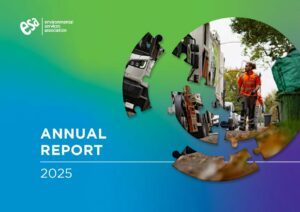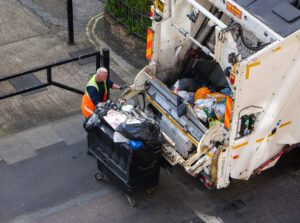Climate and Energy Policy Advisor for the ESA, Charlotte Rule
The Environmental Services Association (ESA) has published a policy scorecard which examines the progress of key policies to support decarbonisation of the recycling and waste sector.
Following the publication of the ESA’s sectoral Net-Zero Strategy in 2021, the scorecard and its short accompanying report examine the progress of key policy instruments and provides a visual indication of regulatory activity while highlighting where uncertainty remains.
The policy areas covered in the scorecard include
- waste prevention and reuse;
- the wider recycling and waste strategy reforms;
- a ban on organic materials form landfill;
- support for landfill gas and carbon capture;
- support for EfW heat networks
- support for net-zero fuels and vehicle fleets.
The scorecard shows that, while Government has made firm commitments across all of the relevant policy areas, delivery against many of these commitments has yet to be achieved. Defra’s Resources and Waste Strategy continues to promise a once-in-a-generation opportunity to reinvigorate the nation’s stagnant recycling rates, but it is the recent announcement on the inclusion of EfW within the Emissions Trading Scheme (ETS) that now represents the most significant regulatory intervention for our sector in a decade or more – although this also holds the potential for unintended consequences if not carefully balanced with other policies to support recycling and reduce waste.
Prior to publication of the scorecard, YouGov undertook a poll of MPs on behalf of the ESA, to gauge views among parliamentarians towards a range of recycling and waste management policy themes.
The poll, which was conducted in May 2023 and surveyed a sample of 108 MPs weighted to represent the House of Commons, found that only a quarter (25%) of MPs claimed they were familiar with the Government’s Resources and Waste Strategy reforms, which are pivotal to the sector. Furthermore, nearly two thirds (59%) of MPs consider that the Government is unlikely to meet its 65% municipal recycling target by 2035.
The poll results also show that the majority (67%) believe that residual waste should be treated through energy recovery (compared with only 7% by landfill and 7% through export) and that two thirds of MPs believe that energy-from-waste will be important to the UK’s transition to green energy.
In response to the scorecard analysis, the ESA has suggested the following interventions for Government to support circular economy investment and decarbonisation, and to get delivery against government commitments back on track.
- Urgently deliver consistent kerbside collections for homes and businesses alongside clear binary recycling labelling.
- Introduce stronger measures to support demand for recycled materials, including a long-term escalator on the plastic packaging tax.
- Ensure critical safeguards are in place to prevent landfilling or export of waste ahead of the introduction of the Emissions Trading Scheme in 2028.
- Deliver a comprehensive biodegradable waste to landfill ban by 2028, as well as clear supporting measures for the collection of organic waste.
- Deliver wider Collections and Packaging reforms without further delay.
- Provide support for landfill gas capture following the Renewable Obligation.
- Continue to deliver essential secondary legislation to enable the deployment of Heat Networks and Carbon Capture from Energy from Waste facilities.
- Work with industry and Local Government to develop a Decarbonisation Plan for Waste Vehicles.
ESA’s parliamentary polling shows that the majority of MPs do not think the Government’s target of reaching sixty-five per cent municipal recycling by 2035 is likely to be achieved. The recycling and waste management sector stands poised to invest an estimated £10 billion in new circular economy infrastructure, which will directly prevent this outcome and help reach the Government’s target, but this investment will not be realised without long-term policy clarity and urgent delivery.
The waste and recycling sector, and Government, have both been clear on our respective ambitions to achieve a zero-carbon, zero-waste society, but the scale and pace of action has been hindered by a lack of regulatory clarity and certainty, as highlighted by the associations scorecard. Since 2018, the sector has been waiting for clarity over how key Resources and Waste Strategy reforms will be implemented across England. Every year this is delayed is a lost opportunity for our sector to deliver decarbonisation, green investment and jobs.
By contrast though, the scorecard highlights a quicker pace of policy development to support carbon capture and heat network deployment for Energy from Waste, which has been welcomed by the sector. The continued progression of the Energy Bill through Parliament will provide the sector with the clarity needed to invest in the infrastructure to underpin the UK’s green heat and carbon capture ambitions.




